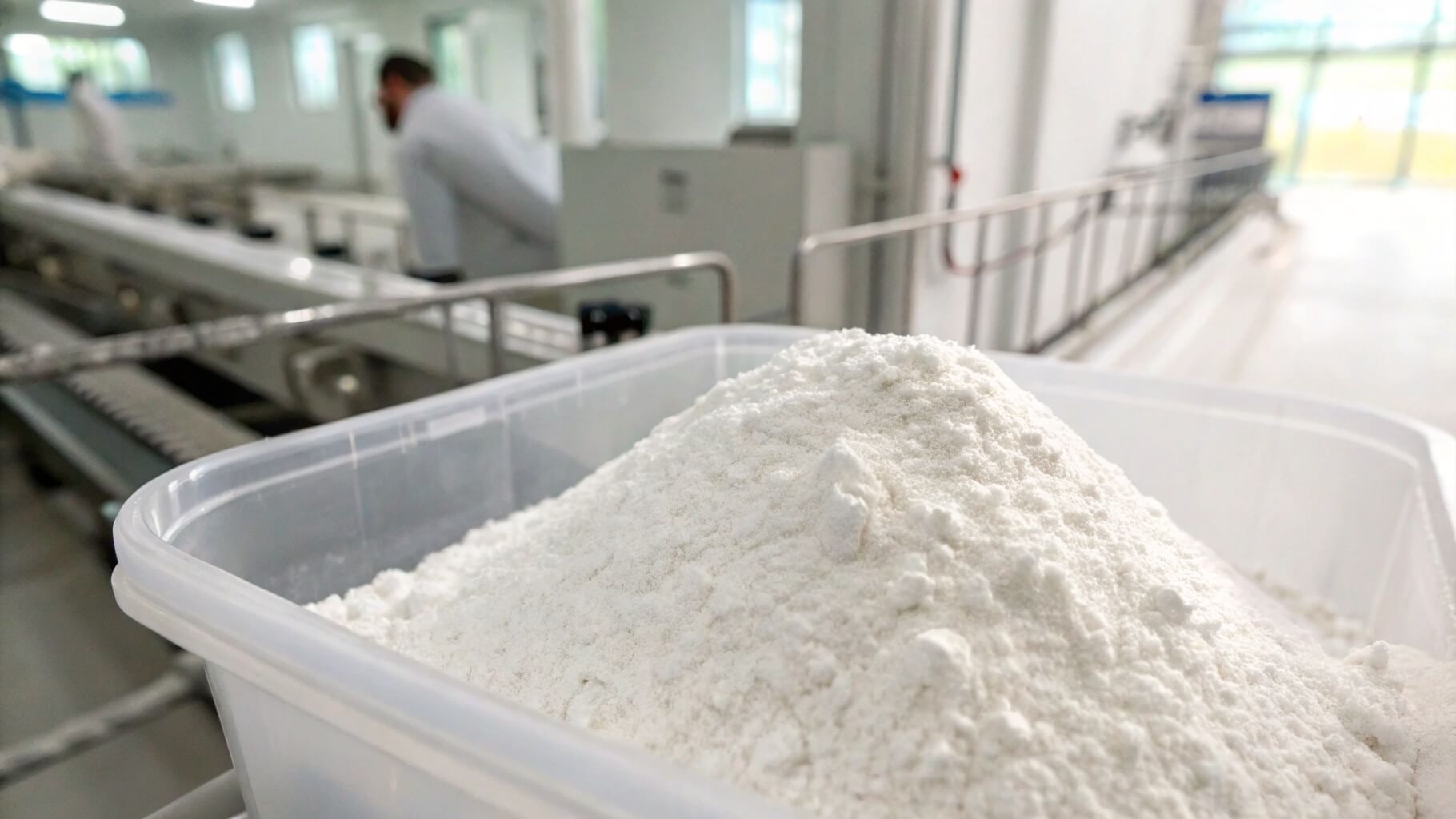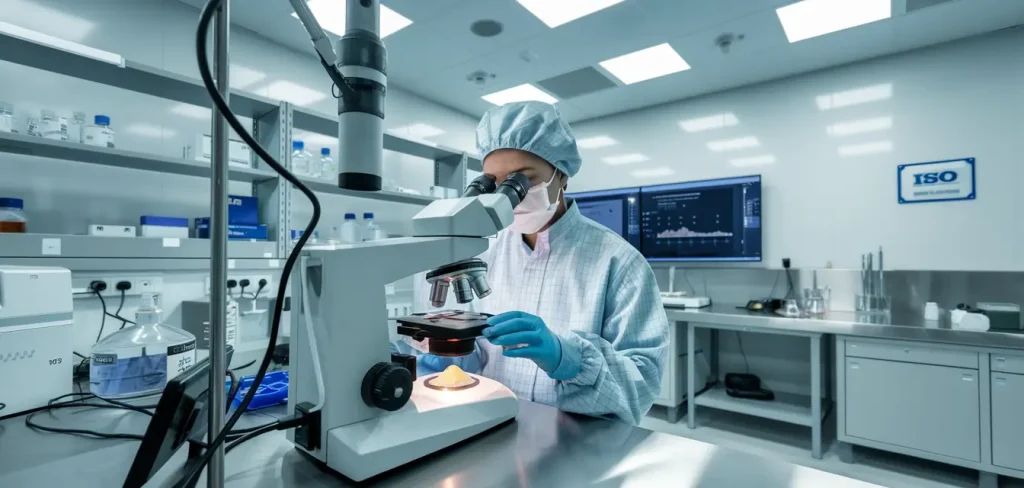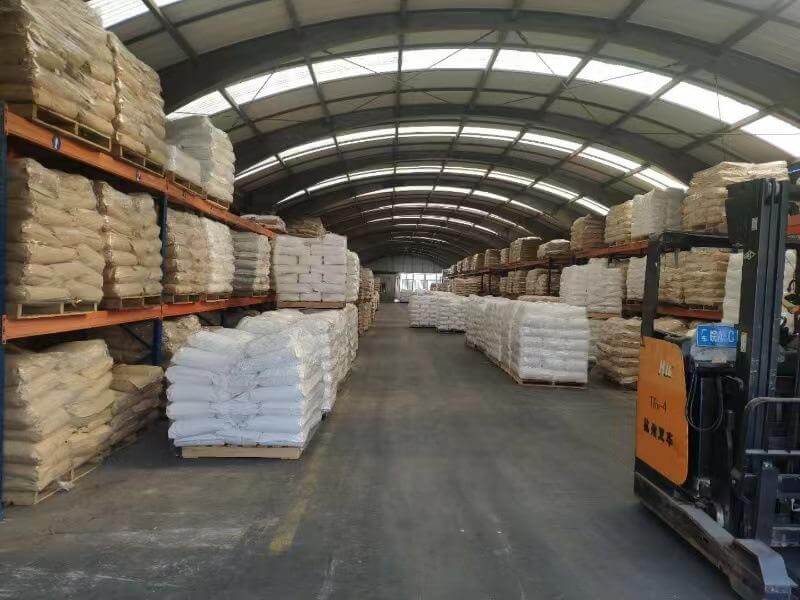Abastecimiento Hidroxipropilmetilcelulosa (HPMC) from China offers cost advantages, but choosing the wrong supplier puede conducir a quality issues, shipment delays, and compliance risks. A well-vetted supplier ensures consistent quality, stable pricing, and reliable deliveries.
China is the world’s leading HPMC producer, supplying industries such as construcción, productos farmacéuticos y procesamiento de alimentos. To secure a trustworthy partner, buyers must evaluate certifications, manufacturing capabilities, and supplier reliability before committing to long-term contracts.

A visual representation of factory inspections and quality control checks in an HPMC production facility.
How can you differentiate between high-quality manufacturers and unreliable suppliers? In the following sections, we’ll explore key factors, verification steps, and sourcing strategies to help businesses make informed procurement decisions.
Why Choosing the Right HPMC Supplier in China Matters
A poor HPMC supplier can cause product inconsistency, supply chain disruptions, and regulatory non-compliance—all of which lead to costly setbacks. A fabricante de confianza asegura quality, regulatory adherence, and timely delivery, reducing operational risks.
China domina global HPMC production, supplying industries such as construcción, productos farmacéuticos y procesamiento de alimentos. Choosing a reliable supplier from China provides cost advantages, bulk availability, and internationally compliant quality standards.
The Global Demand for HPMC and China’s Leading Role
HPMC is an essential cellulose ether used as a espesante, estabilizador y emulsionante across multiple industries. It plays a crucial role in:
- Construction Materials: Tile adhesives, dry-mix mortars, and cement-based products.
- Productos farmacéuticos: Tablet coatings, controlled-release formulations, and excipients.
- Industria alimentaria: Dairy alternatives, gluten-free baking, and processed food stabilization.
- Personal Care Products: Used in shampoos, lotions, and skincare formulations.
China supplies over 60% of the global HPMC market, thanks to its cost-efficient manufacturing, well-developed chemical industry, and strong export capabilities. Many Chinese suppliers comply with ISO, GMP, and pharmaceutical-grade standards, making them competitive in Aplicaciones en construcción, farmacéuticas y alimentarias.
The Risks of Unreliable HPMC Suppliers
Not all suppliers in China maintain the same standards. Choosing the wrong supplier can lead to:
- Inconsistent Quality: Poor viscosity control, moisture imbalances, or contamination.
- Delayed Shipments: Unreliable logistics causing production stoppages and financial losses.
- Non-Compliance Issues: Lack of ISO, GMP, or REACH certification leading to import rejections.
- Hidden Costs & Pricing Scams: Unexpected fees for documentation, packaging, or customs.
Low-cost suppliers often cut corners on quality, which can severely impact end-product performance.
Key Benefits of Sourcing from a Trusted Supplier
A verified HPMC manufacturer provides more than just affordability—they offer quality consistency, regulatory compliance, and long-term supply reliability.
Advantages of choosing a reputable supplier:
- Cost Efficiency: Direct factory sourcing avoids unnecessary middlemen markups.
- Product Consistency: Riguroso pruebas por lotes ensures stable viscosity and purity levels.
- Cumplimiento normativo: Certified manufacturers adhere to ISO, USP, EP, and GMP normas.
- Reliable Supply Chain: Well-managed inventory and on-time shipments prevent delays.
Selecting the right HPMC supplier in China is about balancing cost, quality, and reliability. In the next section, we’ll explore key factors to consider when evaluating potential suppliers.
What Are the Key Factors to Consider When Choosing an HPMC Supplier in China?
Not all HPMC suppliers in China maintain high-quality standards, regulatory compliance[^1], or reliable logistics. Choosing the wrong supplier can result in product inconsistencies, supply disruptions, and compliance risks. A reputable supplier ensures consistent quality, stable lead times, and adherence to international standards.
[^1]: Understanding regulatory compliance is crucial for ensuring product quality and avoiding legal issues. This link will provide valuable insights.
To select the proveedor adecuado de HPMC, businesses must evaluate supplier reputation, manufacturing capabilities, certifications, quality control standards, and supply chain efficiency before finalizing contracts.
How to Assess the Supplier’s Reputation in the HPMC China Market
Supplier credibility is crucial in determining product reliability and long-term partnership stability. Key ways to assess a supplier’s reputation include:
- Customer Reviews & Trade History: Platforms like Alibaba, Made-in-China, and industry buyer forums provide real customer feedback.
- Export Experience: Suppliers exporting to strict regulatory markets (U.S., EU, Japan) demonstrate higher quality compliance.
- Business Registration Verification: Use China’s National Enterprise Credit Information System (www.gsxt.gov.cn) to confirm legitimacy.
- Participation in Trade Shows: Leading suppliers exhibit at ChinaCoat, CPhI China, and the Canton Fair, indicating industry credibility.
Importance of Manufacturing Capabilities: Direct Factory HPMC vs. Middlemen
Many suppliers act as middlemen instead of direct manufacturers, lo que lleva a higher costs and inconsistent quality control. Here’s how they compare:
| Factor | Direct HPMC Manufacturer | Trading Company (Middleman) |
|---|---|---|
| Precios | Lower, direct factory pricing | Higher, includes markup |
| Control de calidad | In-house testing & strict standards | Relies on third-party manufacturers |
| Plazo de producción | Faster, controlled supply chain | Delays due to reliance on external factories |
| Opciones de personalización | More flexible (viscosity, substitution levels) | Limited options |
| Transparencia | Open to factory visits and production details | Often vague about product sourcing |
Certifications to Look for: Ensuring Compliance & Quality
El cumplimiento normativo es esencial para global HPMC sourcing. Always request valid certifications from suppliers to verify product quality. Key certifications include:
- ISO 9001: Ensures consistent quality management systems.
- GMP (Good Manufacturing Practice): Crítico para HPMC de grado farmacéutico y alimentario.
- USP, EP, JP: Cumplimiento de U.S., European, and Japanese pharmacopeia standards.
- REACH, ROHS: Requerido para European chemical safety regulations.
- Halal & Kosher: Necessary for food and pharmaceutical applications.
Quality Control Measures: HPMC Testing Methods & Purity Standards
Reliable suppliers implement strict quality control processes Para mantener consistencia del lote. Key testing parameters include:
- Viscosity Measurement: Ensures product consistency for construction and pharmaceutical applications.
- Moisture Content Testing: Controls water retention properties.
- pH Value Verification: Confirms chemical stability and purity.
- Purity & Heavy Metal Testing: Garantiza el cumplimiento de food-grade and pharmaceutical standards.
- Gel Temperature Testing: Essential for cement-based applications and drug formulations.
Lead Times, Bulk Supply, and Order Flexibility
Manufacturing capacity and logistics efficiency affect supply stability. Factors to evaluate include:
- Minimum Order Quantity (MOQ): Some suppliers require bulk orders, while others offer small trial batches.
- Production Lead Time: HPMC production typically takes 2–6 weeks, depending on order size and customizations.
- Shipping & Logistics Support: Evaluate whether the supplier manages freight, customs clearance, and regulatory documentation.
Selecting the right supplier requires more than just cost considerations. Manufacturing capabilities, certifications, and supply chain efficiency should guide procurement decisions. In the next section, we’ll discuss how to verify supplier reliability through audits, sample testing, and background checks.
How to Verify an HPMC Manufacturer’s Reliability?
A supplier claiming to manufacture HPMC does not always mean they have in-house production capabilities. Some companies outsource production while presenting themselves as manufacturers. Failing to verify a supplier’s reliability can lead to product inconsistencies, financial losses, and compliance failures.
A genuine and reliable HPMC manufacturer should have a strong track record, valid certifications, and transparent business operations. Here’s how to conduct a thorough verification process.
Checking Company Background: Licenses, Years in Operation & Export History
Un proveedor business history and legal credentials reflect its reliability and legitimacy. Key verification steps include:
- Confirm Business Registration: Use China’s National Enterprise Credit System (www.gsxt.gov.cn) to check legal status and corporate filings.
- Check Years in Operation: A supplier with 10+ years of production experience is more likely to provide stable quality.
- Analyze Export Records: Suppliers with long-term exports to regulated markets (U.S., EU, Japan) are more likely to meet international standards.
- Review Customer References: Request feedback or case studies from existing international clients.
Conducting Factory Audits: On-Site vs. Third-Party Verification
A factory audit helps determine whether a supplier is a genuine manufacturer or just a reseller. There are two methods:
- On-Site Audits: If possible, visit the supplier’s facility to inspect production lines, raw materials, and quality control processes.
- Third-Party Verification: Services like SGS, Bureau Veritas, and TÜV Rheinland conduct independent audits.
Key areas to check during an audit:
- Production Capacity: Can they handle bulk HPMC orders consistently?
- Quality Control Procedures: Are raw materials tested before processing?
- Cumplimiento normativo: Do they follow ISO 9001, GMP, and USP/EP guidelines?
- Storage & Packaging Conditions: Are HPMC products stored properly to prevent contamination?
Requesting and Analyzing Sample Reports for Quality Consistency
Antes de comprometerse con un proveedor, solicite sample reports to assess HPMC quality consistency. Key test reports include:
- Viscosity Testing: Ensures stability across production batches.
- Moisture & pH Analysis: Confirms chemical integrity.
- Purity & Heavy Metal Testing: Requerido para aplicaciones farmacéuticas y alimentarias.
- Gel Temperature Testing: Crítico para construction and pharmaceutical formulations.
Comparar multiple batches Para asegurar uniformidad del producto. Variations suggest poor production control.
Comparing HPMC Cost Per Ton: Balancing Affordability and Quality
HPMC pricing varies based on supplier reliability, raw material quality, and compliance standards. A low-cost supplier may cut corners, leading to inconsistencies in performance.
| Región | Cost per Ton (USD) | Quality | Cumplimiento normativo |
|---|---|---|---|
| Porcelana | $2,500 – $3,800 | High (depends on supplier) | Some meet full global standards |
| India | $2,000 – $3,200 | Medium (quality inconsistencies) | Varies by manufacturer |
| Alemania | $5,000 – $7,000 | Premium | Strictest compliance |
Seleccionar un HPMC supplier solely based on cost can lead to quality risks. A mid-range or premium supplier with strong compliance records offers better long-term reliability.
Evaluating Supplier Responsiveness and Communication Efficiency
Un proveedor response time and communication clarity reflect its reliability. Indicators of a trustworthy supplier incluir:
- Response Speed: Do they reply within 24–48 hours?
- Technical Knowledge: Can they provide detailed specifications and compliance reports?
- Transparencia: Do they offer clear pricing, certifications, and logistics details upfront?
Poor communication often signals future supply chain problems, hidden fees, or unprofessional operations.
Verifying an HPMC supplier’s credibility requires a multi-step approach—checking business licenses, conducting audits, analyzing quality reports, and assessing communication efficiency. In the next section, we’ll explore common challenges in sourcing HPMC from China and how to mitigate risks.
What Are the Common Challenges in Sourcing HPMC from China and How to Overcome Them?
Abastecimiento HPMC from China can be cost-effective, but supply chain risks, regulatory hurdles, and unreliable suppliers create challenges. Buyers often face fraudulent claims, logistics issues, and payment risks, making due diligence essential.
To secure high-quality, compliant, and stable HPMC supply, las empresas deben identify potential challenges and implement strategic solutions.
Avoiding Fraudulent Suppliers and Certificate Forgery
Algunos proveedores misrepresent their capabilities, posing as manufacturers while reselling third-party products. Others provide forged certifications to falsely claim compliance.
Common red flags include:
- Unrealistically low pricing (below market rates).
- Inconsistent product specifications in different batches.
- Fake ISO, GMP, or REACH documents (manipulated or outdated).
- Refusal to provide business registration or factory details.
How to avoid fraud:
- Verify business licenses via China’s National Enterprise Credit System (www.gsxt.gov.cn).
- Cross-check certifications directly with issuing authorities.
- Request real-time factory videos or live verification calls.
- Work with third-party auditors (SGS, TÜV, Bureau Veritas) for independent validation.
Managing Logistics: International Shipping, Customs Regulations, and Import Duties
Logistics challenges include high shipping costs, customs clearance delays, and regulatory non-compliance. Common issues include:
- Incorrect HS Code classification, leading to customs rejections.
- Unexpected tariffs and import duties, increasing costs.
- Shipping delays due to port congestion or supplier mismanagement.
How to optimize logistics:
- Use the correct HS Code (3912.31.00 for HPMC) to avoid clearance issues.
- Trabaje con transportistas experimentados specialized in chemical imports.
- Plan bulk shipments in advance to reduce per-unit freight costs.
Handling Payment Risks: Secure Payment Terms and Trade Assurance Options
Financial risks arise from unclear payment terms, hidden fees, and supplier non-compliance. Buyers must avoid situations where:
- Full prepayments result in undelivered shipments.
- Price changes occur after order placement.
- Refunds are difficult to claim in case of defective products.
Best payment security strategies:
| Payment Method | Risk Level | Protection Measures |
|---|---|---|
| T/T (Bank Transfer) | Alto | Pay in installments (30% deposit, 70% post-inspection) |
| Letter of Credit (L/C) | Bajo | Payment released only upon contract fulfillment |
| Alibaba Trade Assurance | Bajo | Ensures compliance with delivery and quality terms |
| PayPal/Western Union | Alto | Only suitable for small sample orders |
Using escrow services like Alibaba Trade Assurance protege contra payment fraud and quality issues.
Comparing China vs. India vs. Germany HPMC Manufacturers
HPMC costo y calidad vary based on manufacturing region.
| Región | Cost per Ton (USD) | Quality | Cumplimiento normativo |
|---|---|---|---|
| Porcelana | $2,500 – $3,800 | High (varies by supplier) | Some meet full global standards |
| India | $2,000 – $3,200 | Medium (quality inconsistencies) | Compliance varies |
| Alemania | $5,000 – $7,000 | Premium | Strictest compliance |
Key insights:
- China offers the best balance between cost and quality.
- India provides lower prices but struggles with consistencia del lote.
- Germany ensures premium-grade HPMC but at higher costs.
Selecting the right supplier depends on industry application and compliance needs.
Ensuring Long-Term Supply Stability and Strategic Partnerships
Reliable sourcing requires long-term supplier relationships to avoid price fluctuations and supply disruptions. Risks include:
- Raw material price volatility affecting product costs.
- Production slowdowns due to demand surges.
- Unreliable suppliers failing to meet commitments.
Best practices for securing stable supply:
- Negotiate long-term contracts with fixed pricing.
- Establish ongoing quality control checks.
- Build strong supplier relationships para priority supply during demand spikes.
Por understanding sourcing risks and applying preventive measures, buyers can secure a cost-effective, high-quality HPMC supply chain. In the next section, we’ll explore where to find the best HPMC suppliers in China.
Where to Find the Best HPMC Suppliers in China?
Encontrar una reliable HPMC supplier in China requires knowing where to look. While China hosts hundreds of manufacturers, not all offer consistent quality, regulatory compliance, or efficient logistics. The best sourcing methods include trade shows, online platforms, industry referrals, and third-party procurement agents.
Each method has advantages and risks, depending on budget, sourcing experience, and order size.
Trade Shows and Expos: Meeting Verified Suppliers
Attending industry trade fairs allows buyers to inspect product samples, negotiate pricing, and evaluate manufacturers in person. Key trade events include:
- Canton Fair (China Import and Export Fair): The largest trade exhibition in China, featuring chemical and industrial suppliers.
- ChinaCoat: A specialized event for coatings and construction chemicals, incluido Fabricantes de HPMC.
- CPhI China: Essential for pharmaceutical-grade HPMC buyers requiring GMP-certified suppliers.
- Food Ingredients China (FIC): Relevant for food-grade HPMC applications.
Benefits of trade shows:
- Face-to-face negotiation eliminates miscommunication.
- Demostraciones de productos en vivo provide insights into Rendimiento de HPMC.
- Industry networking helps secure direct factory contacts.
Online Platforms: Alibaba, Made-in-China, and Direct Factory Websites
For buyers who cannot attend trade shows, online B2B platforms provide a convenient way to connect with suppliers. The most reliable platforms include:
- Alibaba: The largest B2B marketplace, offering verified supplier tiers (Gold Supplier, Assessed Supplier).
- Made-in-China: Industry-focused marketplace with factory verification options.
- Direct Factory Websites: Muchos top-tier manufacturers operate independent websites, ofreciendo direct pricing and sample requests.
| Platform | Características principales | Risk Factors |
|---|---|---|
| Alibaba | Trade Assurance, Supplier Ratings | Many middlemen posing as manufacturers |
| Hecho en china | Factory Verification, RFQ (Request for Quote) | Fewer suppliers than Alibaba |
| Direct Factory Websites | Direct negotiation, Customization | Requires independent verification |
How to verify online suppliers:
- Check verified supplier status (Gold Supplier, Assessed Supplier).
- Review customer feedback and transaction history.
- Request business licenses and certifications before placing orders.
Recommendations from Industry Networks and Buyer Groups
Industry connections provide reliable supplier recommendations based on real buyer experiences. Common sources include:
- LinkedIn Industry Groups: Engage in chemical, pharmaceutical, and construction material sourcing discussions.
- Procurement Forums & Buyer Associations: Websites like ChemLinked and Global Sources provide supplier reviews and market insights.
- Existing Supplier Recommendations: If you already source materials from China, ask existing partners for HPMC manufacturer referrals.
Advantages of industry referrals:
- Lower sourcing risks from vetted recommendations.
- Pre-approved suppliers con un historial probado.
- Insider knowledge on pricing trends and negotiation strategies.
Using Third-Party Sourcing Agents and Procurement Companies
For companies without local sourcing experience, third-party procurement firms simplify supplier selection. These agencies offer:
- Supplier vetting & verification through factory inspections.
- Price negotiation using local market knowledge.
- Logistics coordination para customs clearance and shipping.
Top third-party sourcing firms:
- Asia Inspection (QIMA): Specializes in supplier audits and product testing.
- Bureau Veritas & SGS: Proporciona factory verification and compliance audits.
- Local China-based sourcing agents: Handle direct supplier negotiations.
Drawbacks of third-party sourcing:
- Additional fees (typically 3%–10% of the order value).
- Limited supplier options, as agents work with pre-selected manufacturers.
Por combining trade shows, online research, industry networks, and third-party verifications, businesses can find trustworthy HPMC suppliers. In the next section, we’ll outline a final checklist to secure a long-term supply partnership.
Final Checklist: How to Secure a Long-Term Partnership with a Trusted HPMC Supplier
Elegir lo correcto Proveedor de HPMC is only the first step. To maintain consistent quality, stable pricing, and an uninterrupted supply chain, businesses must establish clear agreements, structured quality control, and continuous supplier evaluations. A weak supplier relationship can lead to fluctuating costs, product inconsistencies, and unexpected disruptions.
Here’s a final checklist to ensure a strong, long-term partnership with your HPMC supplier in China.
Ensuring a Transparent Contract Agreement with Clearly Defined Terms
A well-structured contract protects both parties by establishing clear expectations and accountability. Essential contract elements include:
- Product Specifications: Clearly define HPMC viscosity, moisture content, purity levels, and testing standards.
- Order Terms & Lead Times: Specify minimum order quantities (MOQs), delivery schedules, and penalties for late shipments.
- Payment Conditions: Usar secure payment methods como T/T (30% deposit, 70% after inspection) or L/C (Letter of Credit).
- Compliance & Certifications: Ensure the contract includes ISO, GMP, REACH, or other relevant quality standards.
- Dispute Resolution: Outline processes for handling quality issues, delays, or contract breaches.
Setting Up Ongoing Quality Control and Testing Processes
Even a trusted supplier must be monitored to ensure product consistencyLas mejores prácticas incluyen:
- Pre-Shipment Sample Testing: Requerir batch samples before full shipment.
- Third-Party Lab Testing: Usar SGS, Bureau Veritas, or TÜV Rheinland para verificación.
- On-Site Factory Audits: Conducta regular factory inspections para garantizar el cumplimiento.
- Random Batch Testing: Llevar a cabo internal lab tests on received shipments.
Establishing a Reliable Communication Channel for Seamless Transactions
Strong supplier relationships depend on clear, responsive communicationLas mejores prácticas incluyen:
- Dedicated Account Managers: Assign a primary contact person on both sides.
- Regular Performance Reviews: Schedule monthly or quarterly meetings.
- Escalation Procedures: Define a structured process for dispute resolution.
Negotiating Long-Term Pricing and Exclusive Supply Agreements
To secure cost stability and supply priorityLos compradores deberían lock in long-term agreements. Key strategies:
- Multi-Year Contracts: Secure bulk pricing discounts over 12–24 months.
- Raw Material Cost Adjustments: Agree on pricing adjustment mechanisms.
- Exclusive Supply Agreements: Negotiate for exclusive supply rights for customized HPMC formulations.
Monitoring Supplier Performance Regularly for Continuous Quality Assurance
Even established suppliers must be evaluated Para mantener consistent standards. Key performance metrics include:
| Performance Metric | Target Expectation | Red Flags |
|---|---|---|
| On-Time Delivery Rate | 95% or higher | Frequent shipping delays |
| Product Quality Consistency | Meets agreed specs | Viscosity variations, contamination |
| Communication Responsiveness | <24-hour response time | Unanswered emails, vague replies |
| Cumplimiento normativo | Up-to-date certifications | Expired or missing documents |
Tracking supplier performance through structured audits and quality reviews asegura long-term reliability and supply chain stability.
By implementing clear contracts, structured quality control, and long-term pricing agreements, las empresas pueden secure a sustainable partnership with their HPMC supplier.
For companies looking to optimize their HPMC sourcing strategy, engaging in supplier audits, implementing trade assurance, and negotiating bulk contracts will significantly improve procurement efficiency and quality assurance.
Preguntas frecuentes
How do I find a reliable supplier in China?
Encontrar una proveedor confiable de HPMC in China requires due diligence and verification. The best approach includes attending industry trade shows (Canton Fair, ChinaCoat, CPhI China) and using verified B2B platforms like Alibaba, Made-in-China, and Global Sources. Request certifications (ISO, GMP, REACH), export records, and sample test reports to verify quality consistency. Conduct auditorías de fábrica either in-person or through third-party verification agencies (SGS, TÜV Rheinland, Bureau Veritas). Reviewing past customer feedback, production capacity, and supply history also helps determine a supplier's reliability.
¿Quién es el proveedor de HPMC en China?
Hay múltiples HPMC suppliers in China, incluido direct manufacturers and trading companies. Some of the leading HPMC manufacturers export to international markets and hold certifications for construction, pharmaceutical, and food applications. It is essential to verify whether a company owns a production facility or is acting as a middleman. Checking their factory size, in-house testing capabilities, and product batch consistency helps identify authentic manufacturers.
How to find the right supplier in China?
To find the proveedor adecuado de HPMC, follow these steps:
- Clarify Requirements: Identify the exact HPMC grade, viscosity level, and industry application (construction, pharma, food, etc.).
- Compare Supplier Options: Usar B2B platforms, trade shows, and industry recommendations to shortlist verified suppliers.
- Verify Production Capability: Confirm whether the supplier is a direct manufacturer or a trader by requesting factory documents and conducting audits.
- Assess Quality Standards: Pedido sample reports, third-party lab testing results, and compliance certifications to confirm product consistency.
- Evaluate Logistics & Pricing: Comparar MOQ, lead times, and cost per ton while ensuring transparent pricing and contract terms.
¿Quién es el fabricante de HPMC?
Several established manufacturers in China especializarse en Producción de HPMC para industrias como construcción, productos farmacéuticos y procesamiento de alimentos. A true manufacturer should have in-house production facilities, strict quality control protocols, and international regulatory compliance. To verify a manufacturer, request business licenses, factory photos, production capacity details, and export records. Checking global certifications such as ISO, USP, EP, GMP, and REACH is also necessary for ensuring high standards.




